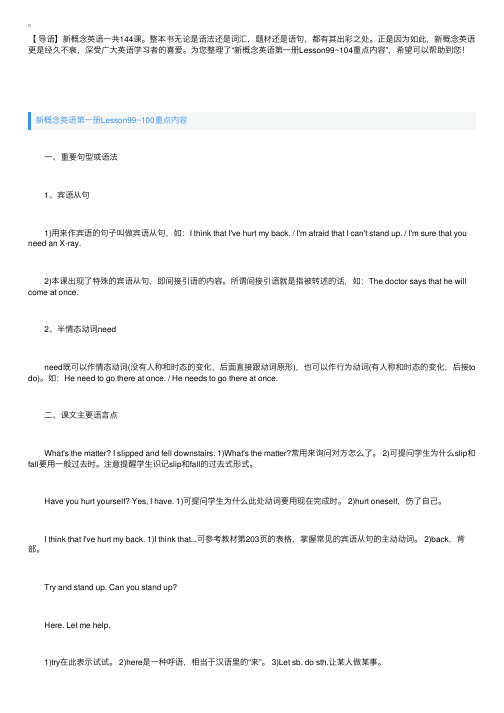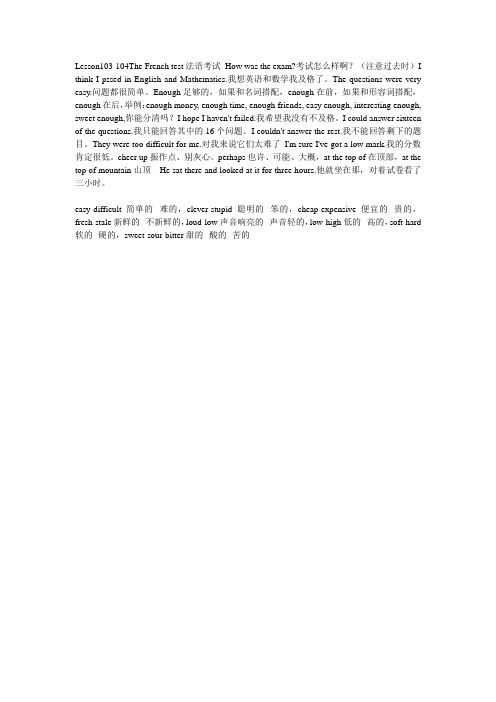新概念英语第1册第103-104课重点语法.doc
新概念103-104课重点语法知识

新概念103-104课重点语法知识本课学习的是副词too、very和enough的用法,但其实要学习的是动词不定式to do的用法。
(一)副词too、very和enoughtoo表示“太”,一般后接贬义词汇,如:too bad, too heavy, too fast。
very表示“很;非常”,是个中性词,既可以修饰褒义词,也可以修饰贬义词,如:very good, very bad, very slowly, very quickly。
enough作为副词,表示“足够”,要放在所修饰的形容词或副词后面,如:good enough, well enough。
【注意】enough也可以用作形容词,表示“足够的”,放在名词前面,用来修饰名词,如:enough books, enough water。
(二)不定式to do的用法1、too...to...该句型表示“太...,而不能...”。
too后面接的是形容词或副词,to后面接的是动词原形。
且to do前面有的时候需要加上for sb.。
如:She is too young to attend the party.她太小了,不能参加这个聚会。
The box is too heavy for me to carry.这个盒子太重了,我搬不动。
2、enough to doenough也常与to do连用,且to do前面有时也需要加上for sb.。
如:She is old enough to attend the party.她年龄够大了,可以参加这个聚会。
The box is light enough for me to carry.这个盒子够轻,我可以搬得动。
新概念英语第一册Lesson99~104重点内容

【导语】新概念英语⼀共144课。
整本书⽆论是语法还是词汇,题材还是语句,都有其出彩之处。
正是因为如此,新概念英语更是经久不衰,深受⼴⼤英语学习者的喜爱。
为您整理了“新概念英语第⼀册Lesson99~104重点内容”,希望可以帮助到您!新概念英语第⼀册Lesson99~100重点内容 ⼀、重要句型或语法 1、宾语从句 1)⽤来作宾语的句⼦叫做宾语从句,如:I think that I've hurt my back. / I'm afraid that I can't stand up. / I'm sure that you need an X-ray. 2)本课出现了特殊的宾语从句,即间接引语的内容。
所谓间接引语就是指被转述的话,如:The doctor says that he will come at once. 2、半情态动词need need既可以作情态动词(没有⼈称和时态的变化,后⾯直接跟动词原形),也可以作⾏为动词(有⼈称和时态的变化,后接to do)。
如:He need to go there at once. / He needs to go there at once. ⼆、课⽂主要语⾔点 What's the matter? I slipped and fell downstairs. 1)What's the matter?常⽤来询问对⽅怎么了。
2)可提问学⽣为什么slip和fall要⽤⼀般过去时。
注意提醒学⽣识记slip和fall的过去式形式。
Have you hurt yourself? Yes, I have. 1)可提问学⽣为什么此处动词要⽤现在完成时。
2)hurt oneself,伤了⾃⼰。
I think that I've hurt my back. 1)I think that...可参考教材第203页的表格,掌握常见的宾语从句的主动动词。
新概念英语第一册第103-104课重点语法

新概念英语第一册第103-104课重点语法一、重要句型或语法1、副词too、very和enough1)too和very都有“很、非常”的含义,但too一般都用来修饰消极或负面的形容词或副词,而very则是偏中性的。
2)enough修饰名词时,放在前面,如enough water/books;修饰形容词或副词时,则要后置,如good enough/well enough。
二、课文主要语言点How was the exam, Richard? Not too bad.1)句中之所用was,是因为Gary问的是Richard之前参加过的考试的情况。
2)not too bad,不太糟糕、不算太坏。
往往说明结果还能够。
I think I passed in English and Mathematics.1)能够问学生句中的pass为什么用过去式(因为是在描述过去发生的事情)。
2)注意mathematics的重音和拼写,能够简写为math(美式英语)或maths(英式英语)。
另外,学科的单词首字母一般都要大写。
The questions were very easy.可由easy引出difficult。
How about you, Gary?how about,用来提问或建议。
本句问的是Gary考试的情况。
The English and Maths papers weren'teasy enough for me.paper表示纸张时,是不可数名词。
本句中的paper指的是试卷,是可数名词,所以要用复数s。
I hope I haven't failed.1)I hope后接宾语从句,省略that。
2)fail,失败。
经常用来表示考试不及格,而且要注意:如果要表达某门学科考试不及格,直接用“fail+学科”。
如:He failed English.I think I failed the French paper.注意fail的用法。
新概念英语第一册惯用语整理Lesson103-104

新概念英语第一册惯用语整理Lesson103-104
Lesson l03~l04
1.cheer v. 吹呼(表示高兴、赞许、鼓励等);使某人高兴;鼓励
cheer sb.up 使某人高兴(振作)起来(make sb.happy or excited)
例句:l.Linda seems to know just the right thing to say
to Jack in order to cheer him up.
琳达似乎知道该说什么话让杰克高兴起来。
2.Cheer up and look on the bright side of life.
振作起来,要看到生活中光明的一面。
2.exam n. 考试
midterm exam 期中考试
例句:I'm exhausted. I stayed up the whole night studying for my history midterm exam.
我太累了。
我熬了整整一夜准备我的历史期中考试。
final exams 期末考试(期中考试为midterm exams)
A:Alice has been spending a lot of time at the library lately.
A:最近爱丽斯绝大部分时间都在图书馆。
B:Well, she's got a paper due and two final exams next week.
B:她有篇论文该交了,而且下周她还有两个期末考试。
新概念第一册103104课笔记

新概念第一册103、104课笔记序言新概念英语是一套全新的英语教材,以其简洁清晰的语言和丰富的课文内容而备受学习者们的喜爱。
其中,第一册的103和104课堪称是重要的一课,本文将通过对这两篇课文的学习和总结,为读者提供一份全面而详细的笔记。
103课笔记1. 课文内容本课的课文主要围绕“shopping(购物)”展开,通过对表达购物需求、商店种类以及购物场景的描绘,帮助学习者掌握相关的词汇和表达方式。
2. 关键词汇课文中涉及到了一些重要的词汇,如“grocer(杂货铺)”、“butcher(肉铺)”和“something(某物)”等,学习者需要注意这些词汇的拼写和发音。
3. 语法点本课的语法重点主要在“a, an和some的用法”上,通过对a 和an的区分以及some的用法加深学生对其的理解,并通过练习巩固相关知识。
104课笔记1. 课文内容本课的课文主要是讲述一个女士迷路的故事,通过对路线指引和方向描述的学习,帮助学习者提高在类似情境下的应变能力。
2. 关键词汇课文中涉及到了一些关于方向和地点的词汇,如“cross(穿过)”、“turn(转弯)”和“road(道路)”等,学习者需要对这些词汇进行掌握。
3. 语法点本课的语法重点主要在“介词的使用”上,通过对in, on和at等介词的运用进行学习,加深学生对其应用范围和用法的理解。
总结通过对这两篇课文的学习和总结,我们不仅深入了解了购物和迷路等日常生活场景下的英语表达方式,更加熟悉了一些重要的词汇和语法知识。
在学习新概念英语的过程中,我们需要不断总结经验,加强练习,才能够更好地掌握英语,提高英语交流能力。
结语通过这篇笔记,相信读者们能够对新概念第一册的103和104课有更加深入的了解,对于之后的学习和复习也能够更有针对性和方向性。
希望大家在学习过程中能够坚持不懈,不断提高自己的英语能力。
新概念第一册103、104课笔记扩展序言新概念英语是一套备受推崇的英语教材,其深入浅出的课文内容和丰富多彩的语法知识使其备受广大英语学习者的喜爱。
新概念第一册103-104课

question [`kwestʃən]
easy [i:zi]
answer [a:nsə]
fail [feil]
difficult [difikəlt]
top [tɔp] mark [ma:k] rest [rest] cheer [tʃiə]
low [ləu] hate [heit]
• 1.exam n. 考试(examination 较为正式一些)
• 区别
•
test (专项技能的)考试
•
driving test 驾照考试
•
quiz 小测验(非正式)
• 2.pass
• 1) v. 及格,通过 pass the exam • 只有十名学生通过了考试。
• Only ten students passed the exam. • pass in +具体学科 • pass in Mathematics • pass in Chinese • 2)把…递给… • pass sb sth= pass sth to sb • Please pass him the paper.
• 1) n. 答案 • 你知道这道题的答案吗 • Do you know the answer to this question? • 2) v. 回答 • 他不想回答我。 • He doesn’t want to answer me. • 2) v. 应答,回应 • 请接电话。 • Please answer the phone. • 应门answer the door
?
• 5. He can speak little French,
can he
?
• 6. She never went to Shanghai,
新概念第一册第103-104课重点知识

Lesson103-104The French test法语考试How was the exam?考试怎么样啊?(注意过去时)I think I pssed in English and Mathematics.我想英语和数学我及格了。
The questions were very easy.问题都很简单。
Enough足够的,如果和名词搭配,enough在前,如果和形容词搭配,enough在后,举例:enough money, enough time, enough friends, easy enough, interesting enough, sweet enough,你能分清吗?I hope I haven't failed.我希望我没有不及格。
I could answer sixteen of the questions.我只能回答其中的16个问题。
I couldn't answer the rest.我不能回答剩下的题目。
They were too difficult for me.对我来说它们太难了I'm sure I've got a low mark.我的分数肯定很低。
cheer up振作点、别灰心。
perhaps也许、可能、大概,at the top of在顶部,at the top of mountain山顶He sat there and looked at it for three hours.他就坐在那,对着试卷看了三小时。
easy-difficult简单的--难的,clever-stupid聪明的--笨的,cheap-expensive便宜的--贵的,fresh-stale新鲜的--不新鲜的,loud-low声音响亮的--声音轻的,low-high低的--高的,soft-hard 软的--硬的,sweet-sour-bitter甜的--酸的--苦的。
新概念英语一讲义教师版L103~104教师版

Lesson 103 ~ 104 The French test(1) exam n. 考试e.g. I took the English exam yesterday.我昨天参加了英语考试。
【学生版不出现】注意:exam是examination的简称。
(2) pass v. 及格,通过e.g. I passed in English. 我数学及格了。
常用表达:pass in表示通过某一科目的考试;pass表示通过某一次考试,后面直接跟考试名词试一试:1. 罗宾通过了这次的考试。
Robin passed this examination.2. 彼得没有通过计算机课目的考试。
Peter didn’t pass in Computer Science.(3) mathematics n. 数学e.g. Mathematics is my favorite subject.数学是我最喜欢的科目。
注意:缩写形式是Maths/Math(4) question n. 问题e.g. 你还有什么问题吗?Do you have any questions?(5) easy a. 容易的e.g. It is an easy test. 这是个简单的测试。
反义扩展:1. hard 2. difficult【学生版不出现】常用搭配:take it easy 放轻松,慢慢来(6) enough① adv. 足够地用法:修饰形容词和副词,放在其后,如:e.g. He failed the exam because it wasn't easy enough.他考试不及格,因为题不够简单。
② adj. 足够的用法:修饰名词,用在名词之前,如:e.g. He didn’t' t buy the car because he didn't have enough money.他没买那部车,因为他没有足够的钱。
- 1、下载文档前请自行甄别文档内容的完整性,平台不提供额外的编辑、内容补充、找答案等附加服务。
- 2、"仅部分预览"的文档,不可在线预览部分如存在完整性等问题,可反馈申请退款(可完整预览的文档不适用该条件!)。
- 3、如文档侵犯您的权益,请联系客服反馈,我们会尽快为您处理(人工客服工作时间:9:00-18:30)。
新概念英语第 1 册第 103-104课重点语法
第 103-104 课的内容:
一、重要句型或语法
1、副词 too 、very 和 enough
1)too 和 very 都有“很、非常”的含义,但too 一般都用来修饰
消极或负面的形容词或副词,而very 则是偏中性的。
2)enough 修饰名词时,放在前面,如enough water/books;
修饰
形容词或副词时,则要后置,如good enough/well enough。
二、课文主要语言点
How was the exam, Richard? Not too bad.1) 句中之所用was,
2)not too
是因为 Gary 问的是 Richard 之前参加过的考试的情况。
bad,不太糟糕、不算太坏。
往往说明结果还能够。
I think I passed in English and Mathematics.1) 能够问学生
句中的 pass 为什么用过去式 ( 因为是在描述过去发生的事情) 。
2) 注
意 mathematics 的重音和拼写,能够简写为 math( 美式英语 ) 或
maths( 英式英语 ) 。
另外,学科的单词首字母一般都要大写。
The questions were very easy. 可由easy 引出difficult 。
,用来提问或建议。
本句问的How about you, Gary?how about
是 Gary 考试的情况。
The English and Maths papers weren't
easy enough for me.paper 表示纸张时,是不可数名词。
本句中的paper 指的是试卷,是可数名词,所以要用复数 s。
I hope I haven't failed.1)I hope后接宾语从句,省略that 。
2)fail,失败。
经常用来表示考试不及格,而且要注意:如果要表达
某门学科考试不及格,直接用“fail+ 学科”。
如:He failed English.
I think I failed the French paper. 注意fail 的用法。
I could answer sixteen of the questions.注意question
回答一般都用 answer。
They were very easy. But I couldn't answer the rest.the
的rest ,剩余的、其他的。
They were too difficult for me. me其实是句型“ too...to...”(太...
句中的
而不能 ...)
too difficult for
的使用。
French tests are awful, aren't they?1)awful ,可怕的、糟糕的。
2) 注意讲解反义疑问句的用法。
I hate them.hate ,讨厌、憎恶。
与like 相反。
I'm sure I've got a low mark.1)I'm sure
语从句。
2)have got,表示得到。
3)a low mark mark 相当于 score 。
后接省略 that的宾,成绩差、分数低。
Oh, cheer up!cheer up ,振作起来。
Perhaps we didn't do too badly.1)perhaps ,也许。
表示可能
性较低,所以语气显得更为委婉。
2) didn't(因为实在描述过去发生的事情所以用 too 来表示水准。
可提问学生为什么本句用
) 。
3)badly是负面的、不好的,
The guy next to me wrote his name at the top of the
paper.1)next to,靠近、临近、隔壁。
2)at the top of ,在 ... 的顶部、顶端。
Yes?注意用升调,表示疑问。
Then he sat there and looked at it fro three hours!
He didn't write a word!1) look at ,有些学生总会漏掉调效果更好。
三、双课补充内容注意 sit 的过去式为 sat 。
2) 注意
at 。
3) 如果在 word 前增加 single ,强
1、操练 too 、very 和 enough 的用法。
2、注意识记教材第212 页中的生词。
